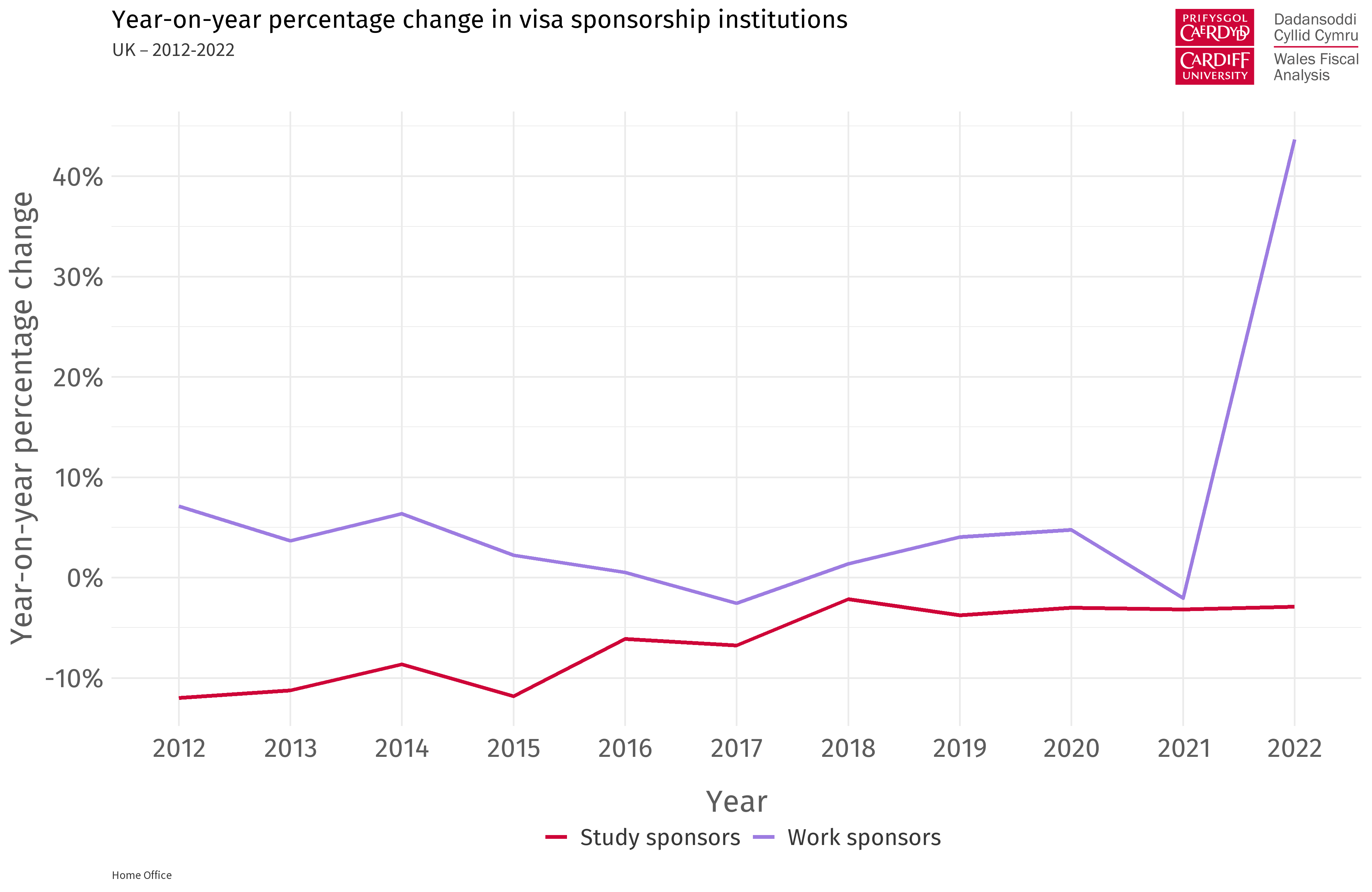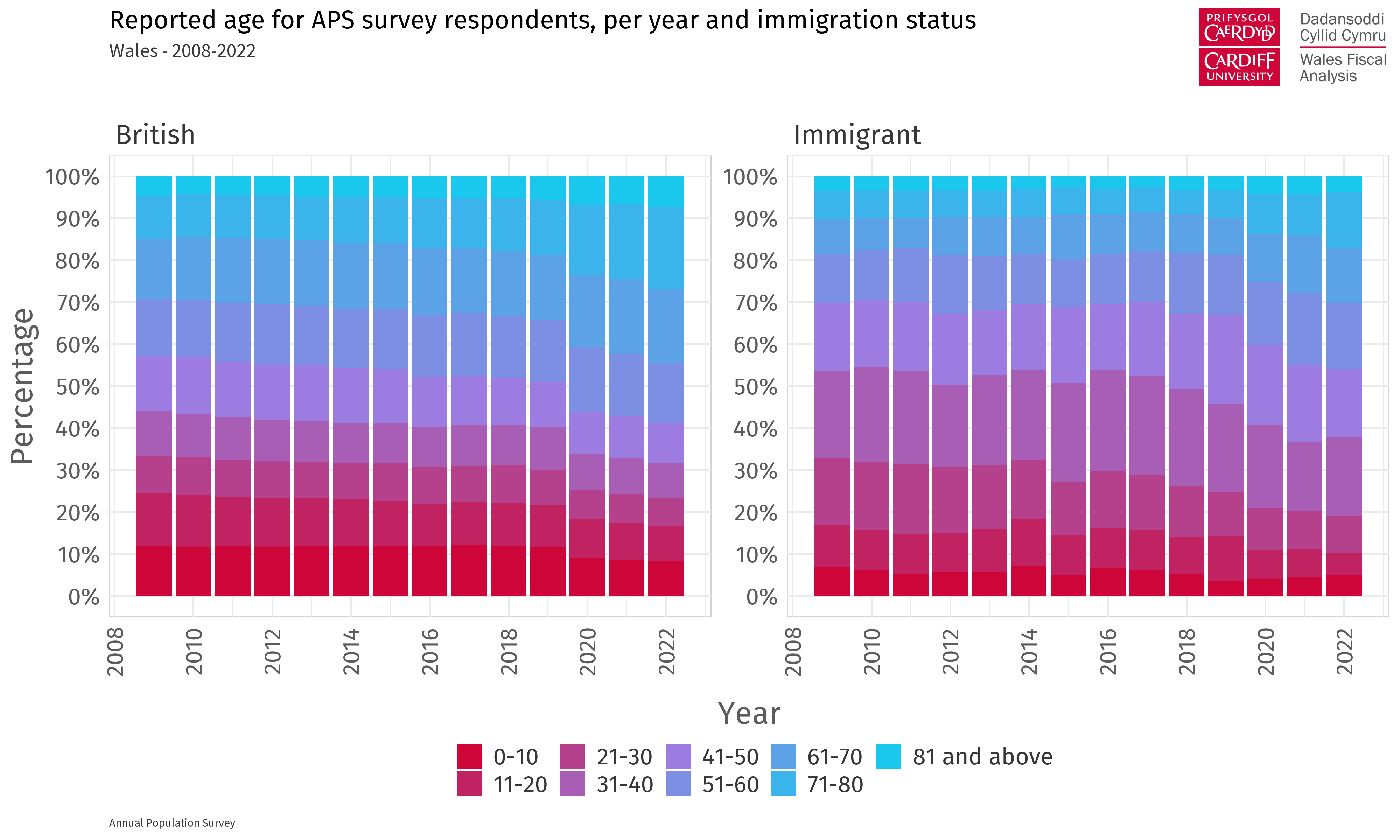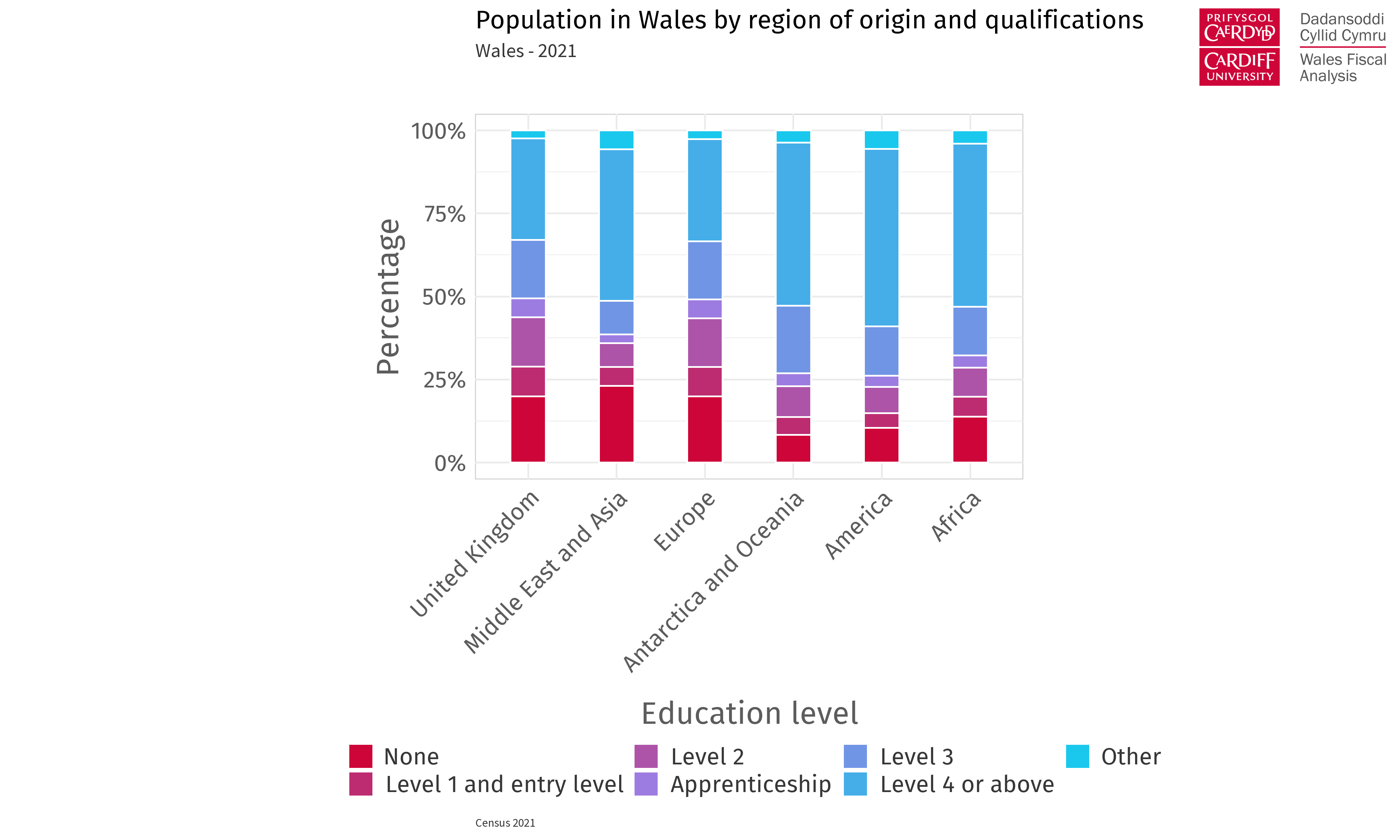Immigration in Wales and the Immigration Health Surcharge
6 December 2023Wales Fiscal Analysis has conducted a review of data regarding the economic impact of immigration in Wales and how the Immigration Health Surcharge might create negative incentive’s for the immigration of skilled workers and overseas students.
The UK visa system is categorised into general applications and the points-based system. To work or study in the UK, an applicant requires an institutional sponsor and proof of income. After a sharp decrease during the Covid-19 pandemic, there was a 43% increase in work sponsorship institutions from 2021 to 2022. The total number of work visas and extensions reached 370,959 in 2022. Among Wales residents, currently 215,429 individuals are born outside the UK.

Immigrants in Wales
The foreign-born population in Wales is diverse and contributes significantly to the region’s demographic dynamics. With its ageing population, immigrants in Wales tend to fall within the 20-44 age bracket and have more children than the native population.

Economic migrants are also more likely to have more years of formal education given the requirements imposed by the Home Office on the points-based system. In addition, they are only allowed to enter the country with a minimum salary, which has ensured that their income has met the same income levels of British workers in Wales.

Evidence on the effects of economic migrants in Wales and the UK as a whole has demonstrated a positive consequence on the skills shortage, an increase in the talent pool and shared skills coming from abroad, an increase in the overall population growth, and more diffuse cultural and economic benefits. On the other hand, businesses that requires low-wage labour and small businesses are not able to benefit from immigration policies, and those who have not faced a skilled shortage have been neutral on the issue. Integration of immigrants is also a problematic issue often with increased racist violence.
The Immigration Health Surcharge
The IHS is charged along with the visa and is proportional to the time spent in the country by the individual. It began in 2015 as a £200 annual charge to access NHS services levied on immigrants from outside the European Union. The fee was doubled to £400 for general applicants in December 2018, before being increased again in October 2020 to £470 per year for students and children and £624 per year for adults.
In July 2023, it was announced by Prime Minister Rishi Sunak that visa charges and the IHS would be increased, with the latter being raised to £1,035 for most applicants and to £776 for child/student applicants, to fund public sector pay rises. The total received from the IHS by the United Kingdom and distributed to Welsh Government amounted to 0.4% of the NHS budget for Wales in 2022-2023.
Conclusion
The presence of economic migrants and overseas students has undeniably shaped Wales’ economy and society. Their contributions extend beyond filling labour market gaps; they also enrich cultural diversity and stimulate economic development. As such, it’s crucial for immigration policies to be continually reviewed and adjusted to ensure they align with regional needs and priorities.
However, these policies are not devolved, and Welsh Government needs to make lateral moves to seek solutions that combine immigration, skills shortages, and an ageing population. Taking into account that economic migrants are in fact paying double to access the NHS, paying income tax, National Insurance, and the IHS and that there have been measures removing this charge to facilitate the entry of overseas workers in the country, a possibility that is available to Welsh Government is to refund the sum from the IHS to economic migrants who settle there.
It is a delicate matter given the controversial topic that immigration has become in the UK, particularly in the last few days, but immigrants play a vital role in Wales’s economy. Their contributions are significant and multifaceted, impacting various sectors and aspects of Welsh life and important for the future of Wales.
Read the full briefing here.
- December 2025
- November 2025
- October 2025
- September 2025
- June 2025
- May 2025
- March 2025
- February 2025
- December 2024
- October 2024
- September 2024
- July 2024
- June 2024
- December 2023
- November 2023
- August 2023
- February 2023
- December 2022
- November 2022
- September 2022
- July 2022
- April 2022
- March 2022
- January 2022
- October 2021
- July 2021
- May 2021
- March 2021
- January 2021
- November 2020
- October 2020
- August 2020
- July 2020
- June 2020
- May 2020
- April 2020
- March 2020
- October 2019
- September 2019
- June 2019
- April 2019
- March 2019
- February 2019
- December 2018
- October 2018
- July 2018
- June 2018
- April 2018
- December 2017
- October 2017
- July 2017
- June 2017
- May 2017
- April 2017
- March 2017
- February 2017
- January 2017
- December 2016
- November 2016
- October 2016
- September 2016
- Bevan and Wales
- Big Data
- Brexit
- British Politics
- Constitution
- Covid-19
- Devolution
- Elections
- EU
- Finance
- Gender
- History
- Housing
- Introduction
- Justice
- Labour Party
- Law
- Local Government
- Media
- National Assembly
- Plaid Cymru
- Prisons
- Reform UK
- Rugby
- Senedd
- Theory
- Uncategorized
- Welsh Conservatives
- Welsh Election 2016
- Welsh Elections